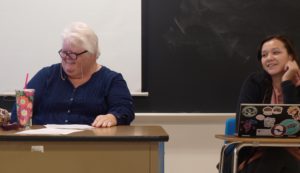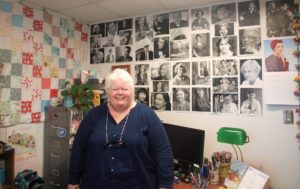
Pam Duncan, left, and student Aaliyah Swimmer, right, laugh about the notion of a sentient rock having insurance in a story from Duncan’s Fiction Writing class at Western Carolina University. Photo by Samantha Lughart.
While many professors at WCU see their role in the classroom as more of an authoritative one, Pam Duncan, author and Associate Professor in the English Department at WCU, sees her role in the creative writing classroom differently.
“In the writing classroom, I don’t feel qualified to tell anybody how to be a writer,” Duncan said. Using a friend’s description, she said, “The teacher in a creative writing classroom is the leader of the learners. I’m learning too.”
Through her experience as an author and teacher, Duncan helps guide creative writing students toward finding their own unique styles.
Duncan graduated with her master’s from UNC Chapel Hill, published three novels and directed the WCU Spring Literary Festival for nine years and has been teaching at WCU since the fall of 2008. Her first novel, Moon Women, was published in 2001 with positive reviews from readers as well as Publishers Weekly.
“Duncan shows promise as a from-the-heart quirky storyteller” was the end line of the Publishers Weekly review on her debut novel.
Though an established author, Duncan blends in easily with the emerging writers she teaches, providing valuable feedback on students’ works and advice for becoming a published author, all while maintaining a relaxed class environment.
One of her students, Aaliyah Swimmer, 20, described Duncan in one word.
“Relatable. She is approachable, always waves at her students when she sees them, and she is just kind overall.”
Duncan struggled in the past when choosing her future, similar to many college students and the choices they face. While she earned her bachelor’s degree in journalism, it was not her passion. Duncan found her calling in creative writing and excelled in this field, earning her recognition as an Appalachian author. Silas House, also an Appalachian author, wrote an article about Duncan as a writer and person.
“The reason that Pam’s writing sings is because it rings with the voices of the people,” House said.
Writing is still close to her heart, though Duncan devotes a large amount of her energy toward her teaching, working to help students in finding their own style of writing. Teaching classes from Introduction to Creative Writing to Fiction Writing, Duncan urges students to open their minds and try their best. She encourages her students to read and write often as well, providing example short stories by famous authors to guide them in technique and style.
“She seems to be very passionate about what she’s doing,” Swimmer said. “She pays attention and wants to hear what people have to say.”
A typical class with Duncan has desks set up in a circle and students speaking without raising their hands. Duncan leads the class through the discussion or the workshop of the day, but gives students their chance to voice opinions, concerns, and questions of any kind.
Though many students know her purely as a professor, Duncan still writes professionally. She strives for balance between her work and personal life and works to nurture her love for writing alongside her duty and dedication to her students. Living by her advice to students, Duncan reads and writes often.

In Duncan’s office, she’s surrounded by her friends. Not only friends of the novel-nature, but also a wall of photos, the portraits of writers whose work she loves or is inspired by. She sees them as her council, advising her and providing company. Among them are Steven King, author of horror, and Lee Smith, one of Duncan’s mentors from her time in graduate school at NC State. Photo by Samantha Lughart.
In the spring, Duncan will be reading some of her own work at the 2020 Spring Literary Festival. While she is working on some stories, she’s still deciding whether to read from them or one of her novels. As an author, Duncan acknowledges the window into her mind and life that her work provides, often writing stories about women, the working class, and Appalachia that are close to her heart.
“Really, you’re everywhere in your fiction–you can’t hide it. You just hope nobody knows you well enough to figure it out,” Duncan said.
Duncan helps students to find what they are passionate about, encouraging them to keep journals and research anything they find interesting. Students in Duncan’s fiction class have written on a broad range of topics and themes including love, death, car accidents, memory and life in outer space.
As Swimmer described, Duncan brings an element of relatability into the classroom which allows students to engage with her without the fear of being shut down. Though many students pass through Duncan’s classes, she freely shares her knowledge and experience with anyone willing to learn.
“Read and write. Don’t talk about it, write it. Get it on the page. Read anything and don’t let anybody make you feel ashamed if you like to read science fiction or fantasy. See, I’ve got Steven King right there on my wall. Read something, anything.”


